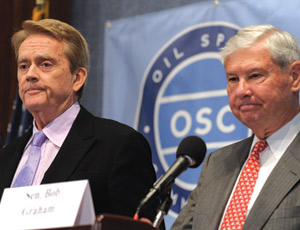Recommendations from a presidentially appointed panel that studied the 2010 Gulf oil spill have drawn a mixed reaction on Capitol Hill. In the Senate, a key Democrat plans to introduce a measure aimed at tightening safety and increasing oversight of offshore drilling. But in the House, Republican leaders gave the panel’s report an icy response. The divided views are likely to stall—or block—legislation to enact the panel’s proposals.

The report said there were “systemic” problems in the oil-and-gas industry and recommended changes in offshore practices and regulations. President Obama called for the study after a drilling-rig explosion last April left 11 men dead and spewed millions of gallons of oil into the Gulf of Mexico.
During testimony before Senate and House committees on Jan. 26, former Environmental Protection Agency Administrator William K. Reilly and former U.S. Sen. Bob Graham (D-Fla.), co-chairmen of the National Commission on the BP Deepwater Horizon Oil Spill and Offshore Drilling, called for changes in how funds are allocated for the Dept. of the Interior’s Bureau of Ocean Energy Management, Regulation and Enforcement. The bureau, established after the spill, replaces Interior’s Minerals Management Service.
Senate Energy and Natural Resources Committee Chairman Jeff Bingaman (D-N.M.) said that, in light of the commission’s report as well as other new information about the spill, he plans to introduce a revised version of a measure that cleared his panel last year.
During testimony about the panel’s report, Graham repeated the commission’s support for allocating 80% of Clean Water Act criminal and civil penalties for Gulf restoration. Sen. Mary Landrieu (D-La.) said she plans to introduce legislation that also would allow revenue from the penalties to go to restore the Gulf coast.
Alaska’s Lisa Murkowski, the committee’s top Republican, was skeptical about the report and said that, overall, the oil-and-gas industry has an exemplary safety record. “The word ‘systemic’ appropriately raises some concerns,” she said.
At the House Natural Resources Committee’s hearing, Chairman Doc Hastings (R-Wash.) criticized the report for not conclusively determining the blowout’s cause. Reilly replied, “We know what happened. I’m quite confident we have established the facts here.”
House Democrats introduced a bill that would enact the panel’s recommendations. Provisions include dedicating fines to coastal restoration and requiring strong standards for blowout preventers, well design and cementing practices. But observers expect Republicans, who control the House, to bottle up the bill.




Post a comment to this article
Report Abusive Comment